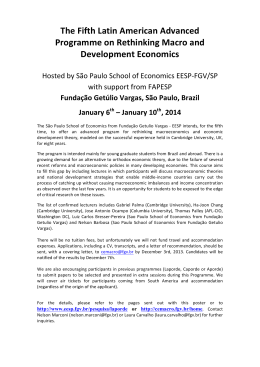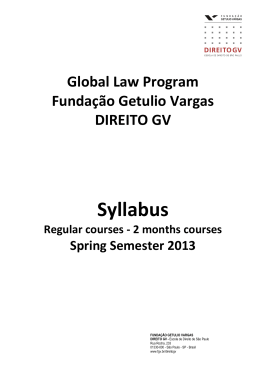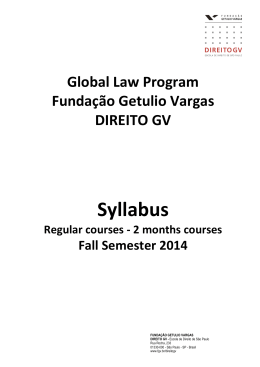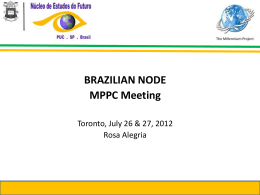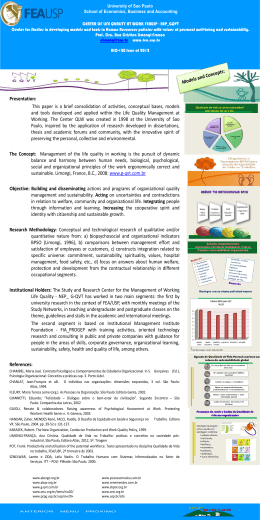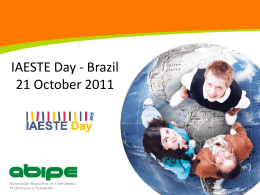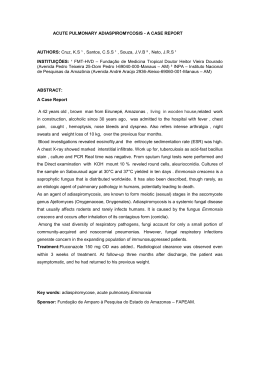SEA in Brazil: Legal-institutional challenges Marina Montes Bastos Master in Law and Development – FGV International Association for Impact Assessment 2015 E-governance and impact assessment: SEA country experience 22-apr-2015 Escola de Direito de São Paulo da Fundação Getulio Vargas Brazilian context on SEA • Voluntary SEA (no standards on the topic) • Environment is seen as obstacle to development • Little practical experience with poor results • Object: projects, not PPPs (not influential) • Low compliance with best practices • Low learning capacity Escola de Direito de São Paulo da Fundação Getulio Vargas Question: What about a voluntary SEA of a government program in Brazil? • Is it effective? • Does it provide learning capacity? • Does it change the way the government deals with the environmental variable? • What influences those results? Escola de Direito de São Paulo da Fundação Getulio Vargas Case study: SEA of the Hydroelectric Generation Program of Minas Gerais • 4th biggest Brazilian state (aprox. size of France) • 2nd biggest population (2x Portugal) • 3rd biggest economy • Sales • Mining Escola de Direito de São Paulo da Fundação Getulio Vargas Case study: SEA-HGPMG • SEA made in 2007 • Hydroelectric developments to be implemented between 2007 and 2027 (6000 mW increase) Escola de Direito de São Paulo da Fundação Getulio Vargas Substantive effectiveness • Reccomendations to the government, such as: • Update SEA • Stimulate other energy sources (sun, wind) • Improve projects in course • Improve power capacity in “old” power plants • The results, after seven years: Complied Almost complied Partially complied Almost not complied Not complied 0 0 2 4 6 Escola de Direito de São Paulo da Fundação Getulio Vargas • Use of SEA findings in environmental studies Nine power plants implemented between 2008 and 2011 One study mentions SEA • SEA-HGPMG did not influence government decisions. Normative effectiveness • Interviews with stakeholders then and now • Government’s vision about the environment did not change. Escola de Direito de São Paulo da Fundação Getulio Vargas Factors influencing the outcomes • Non-compliance with SEA good practices: • SEA seen as study, not as process • No update • No tiering • SEA did not enter the planning system • No training • No public participation • No follow-up Escola de Direito de São Paulo da Fundação Getulio Vargas Factors influencing the outcomes • Reasons that happened: • Lack of political will • Lack of institutional capability ...and there is no law in MG regarding SEA. Did that have any influence in the outcome? Escola de Direito de São Paulo da Fundação Getulio Vargas Legal-institutional dimension Theory Practice Lack of political will + Low learning ability = Need for detailed rules Detailed rules = Excessive bureaucracy + Low implementation capacity What to do? Escola de Direito de São Paulo da Fundação Getulio Vargas Solution Procedural rules • Decisions about PPP should be fundamented in SEA findings. • In case of divergence, the argument should be solid and valid. • Prevents political influences by promoting transparency • Promotes bureau capacity by inserting SEA in the system Escola de Direito de São Paulo da Fundação Getulio Vargas Thank you! Marina Montes Bastos [email protected] Escola de Direito de São Paulo da Fundação Getulio Vargas
Baixar
